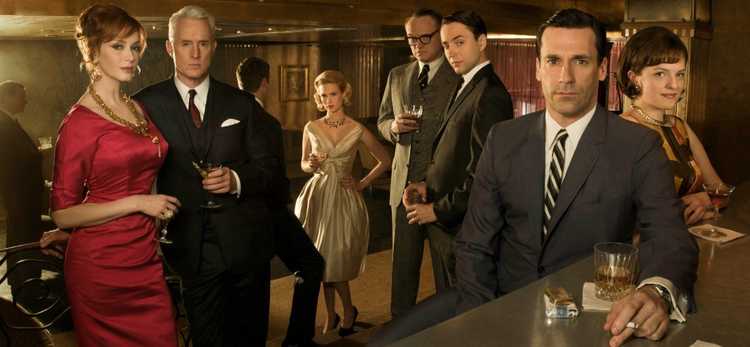
Bad Men And The New Pornography
By Steve Sailer
03/23/2012
I can’t afford cable TV, so I don’t see the big new serial dramas until they come out on, say, Netflix or Hulu for Roku. And then I usually reach the limits of my interest after about six hours: Breaking Bad? Good show! I sometimes wonder what happened to Malcolm’s dad after the first six hours of his new life of crime. Well, I guess I'll never know. Downton Abbey? Good show! But not quite good enough to get me to watch more than six hours of it, even though the first season is only seven hours long and the first six hours have gotten us all the way up to England’s peaceful summer of 1914 and I have this vague hunch that the season finale has some kind of big historical surprise twist up its sleeve. But six hours is my limit, so I guess I'll never find out what happened in August 1914. Something big, I’m sure!
I realize movies are out of fashion, but I do like to point out that they have one virtue over more 21st Centuryish forms of entertainment: noninterminableness. You sit yourself down in the movie theatre and, then, 115 minutes later, they make you go home.
Speaking of antinoninterminablebness, Mad Men is back for its 23rd season (note: check this before posting) of soft core porn for women with the better sort of degrees, but with a new purpose: to avenge Trayvon Martin! Or, at least, that’s what it appears from this review in the NYT:
There was no question that “Mad Men” would get around to the civil rights movement. From the start, racism was the carbon monoxide of the show: a poison that couldn’t always be detected over the pungent scent of cigarettes, sexism, anti-Semitism, alcoholism, homophobia and adultery, but that sooner or later was bound to turn noxious.
That promise was made in the opening scene of the premiere episode of Season 1. The first face on screen is a black one in profile, that of a waiter carrying a tray of cocktails across a bar crowded with white, mostly male customers. …
It’s the show’s willingness to put its characters in the context of the times, and not whitewash the white men, that gives it an edge and keeps a drama that in its fifth season has gotten — let’s face it — a little old and soapy, interesting to watch. Particularly at this moment, when the case of Trayvon Martin, the Florida teenager killed by an armed neighborhood watch volunteer, has become a heated cause, the 1960s look a lot like prologue.
Don and his colleagues are flip, self-centered and oblivious, no different from the many privileged Americans who stood on the sidelines and averted their eyes. They are the ones who ended up on the wrong side of history and whose testimony is usually left out of the textbooks, like the bourgeois Parisians who collaborated — faute de mieux — during the Nazi occupation, the South Africans who welcomed cheap labor under apartheid or the cadets who set fire to the clothes of the first female cadets admitted to the Citadel military college.
Okay!
Having watched six and a fraction episodes of the first season of Mad Men, quite enjoying the first 115 minutes before boredom began setting in, allow me to point out that my 2009 review in Taki’s Magazine explains it all. For example:
While watching Mad Men, Weiner affords us ample opportunity to congratulate ourselves on how much progress we’ve made. For example, most of the black characters in Mad Men have servile jobs. Today, of course, things are infinitely better. Black men are seldom seen in servile jobs (unless they are African immigrants or gay). In fact, black men aren’t seen in any jobs as much anymore: ten percent of black men were out of the work force in Don Draper’s 1960 versus 24 percent in booming 2000. Indeed, black men aren’t even seen at all as much anymore because a million are now locked away in prison. (The incarceration rate of black male high school dropouts was one percent in the Bad Old Days of Dwight Eisenhower’s last year in office versus 25 percent in Bill Clinton’s glorious finale.)The kicker to the joke is that Mad Men, despite being set in New York, is filmed in LA, where Latinos have been imported in vast numbers to fill the servant jobs that today’s upper-middle class whites no longer trust blacks with. Yet Hispanics are even more invisible to the Hollywood elite today than blacks were then.
The one thing I would add about Mad Men is that it’s becoming more apparent, year by year, that 21st Century women of the educated castes who watch Mad Men find themselves increasingly sexually bored by all the pathetic, politically correct weenies of their own class. That’s Mad Men creator Matthew Weiner’s big conceptual breakthrough: that women these days are aroused by men masterful enough to violate today’s thought crime taboos, if the ladies can simultaneously maintain plausible deniability that they are actually shocked, shocked by all the old "racism … cigarettes, sexism, anti-Semitism, alcoholism, homophobia." Mad Men is not actually a satirical put-down of the past; instead, it’s designed to be a titillating turn-on for the present.
